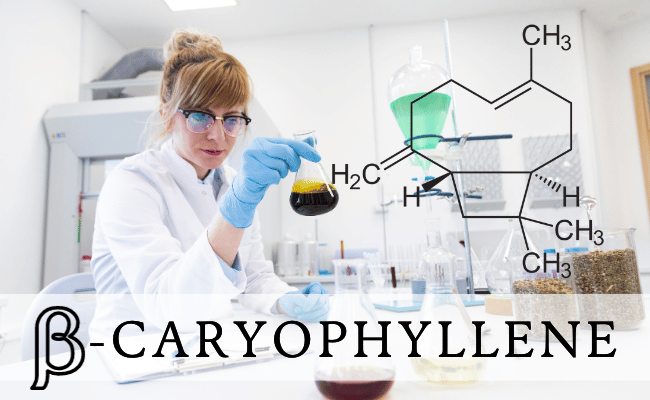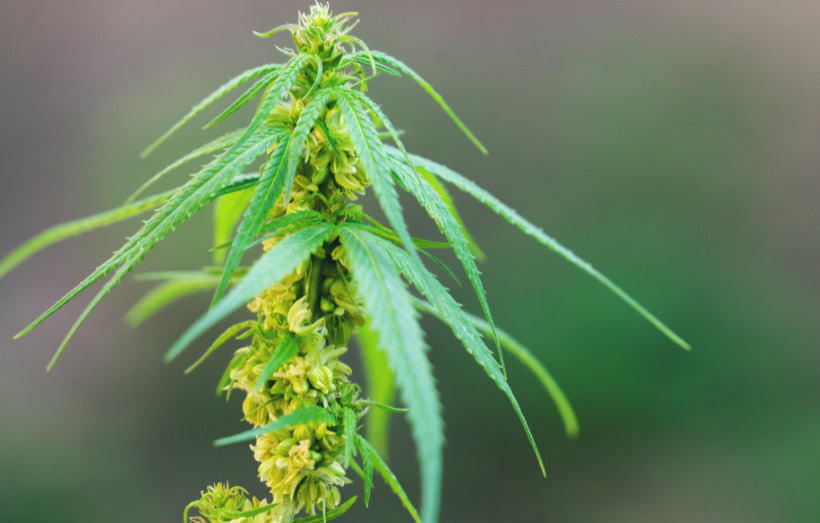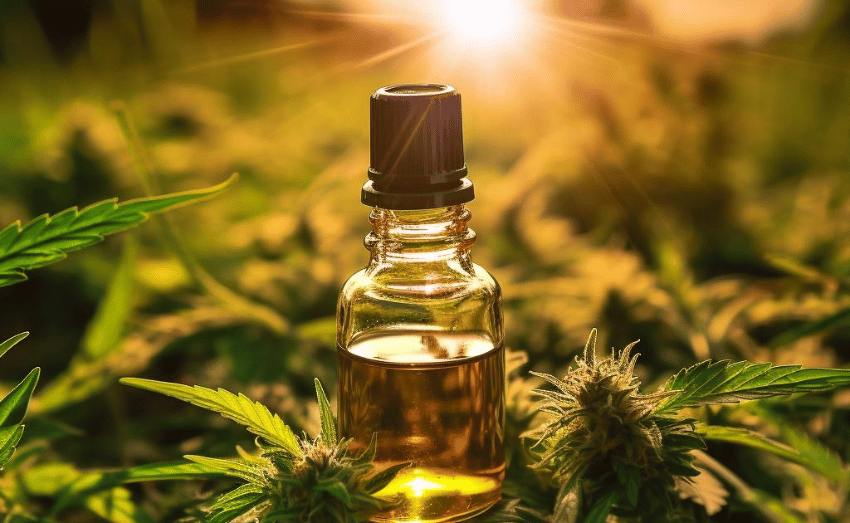Hemp seed oil, often misunderstood due to its association with the cannabis plant, is a natural powerhouse for skin health. Let’s break down the various benefits it offers and why it’s becoming a popular choice for skincare enthusiasts and beginners alike.
What Is Hemp Seed Oil?
Hemp seed oil is obtained by cold-pressing the seeds of the cannabis sativa plant. Unlike CBD oil, which is derived from the plant’s leaves and flowers, hemp seed oil comes from the seeds and typically contains no THC, the psychoactive component of the cannabis plant.
How Does Hemp Seed Oil Benefit The Skin?
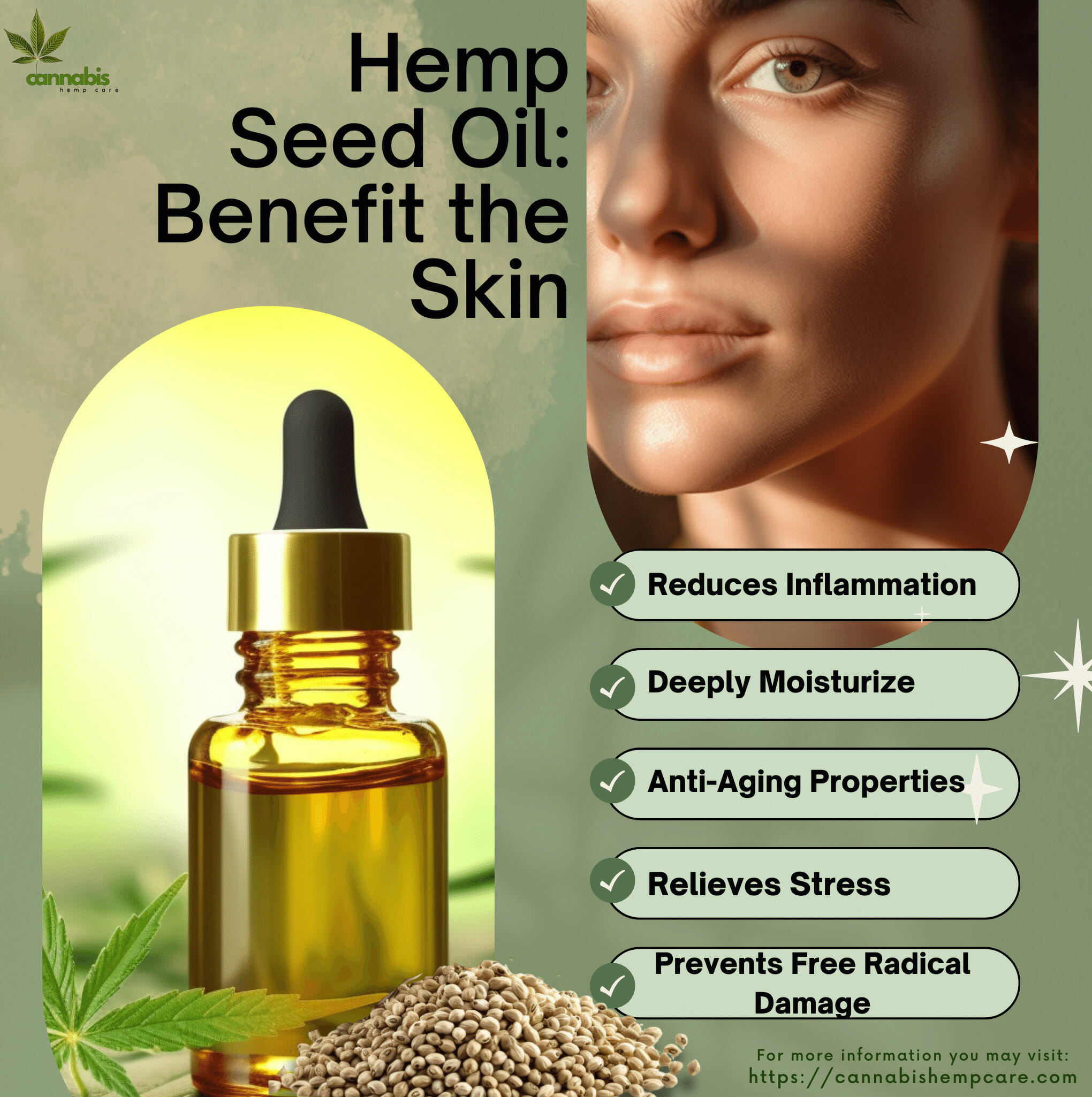
1. Reduces Inflammation:
- What’s inflammation? Think of it as your skin’s way of waving a red flag when something’s wrong, causing redness, puffiness, and sometimes pain.
- How does hemp seed oil help? Hemp seed oil contains omega-6 fatty acids, which are like superstars in calming this red flag-waving. They soothe inflamed areas and promote the growth of new, healthy skin cells.
- Why does this matter? If you have skin conditions like acne, psoriasis, or atopic dermatitis, hemp seed oil can be a game-changer. It tackles the root problem of inflammation, helping your skin heal and look better.
2. Deeply Moisturizes:
- What does ‘moisturize’ mean? It’s like giving your skin a refreshing drink of water. Moisturized skin feels soft, and supple, and has a healthy glow.
- How does hemp seed oil do this? This oil is like a hydration hero. It’s packed with fatty acids that sink deep into the skin, quenching its thirst and preventing it from getting dry, flaky, or itchy.
- Bonus: By strengthening the skin’s protective layer, hemp seed oil ensures this hydration doesn’t escape, keeping your skin moisturized for longer.
3. Anti-Aging Properties:
- Why does skin age? Over time, our skin loses elasticity and starts to show wrinkles, just like how elastic bands lose their stretch after a lot of use.
- How does hemp seed oil counteract this? It’s like a time machine in a bottle. Hemp seed oil is rich in vitamins A, C, E, and F, and fatty acids that make your skin’s protective layer more robust, reducing the appearance of those sneaky fine lines and wrinkles.
- The result? Skin that looks youthful, bouncy, and vibrant.
4. Prevents Free Radical Damage:
- What are free radicals? Imagine tiny villains that attack your skin cells, causing premature aging. They’re caused by pollution, UV rays, and other environmental factors.
- How does hemp seed oil save the day? It’s the superhero your skin needs. By strengthening your skin’s barrier, hemp seed oil acts as a shield, protecting your skin from these tiny villains and preventing them from causing harm.
5. Relieves Stress:
- Stressed skin? Just like a stressful day can make us feel frazzled, our skin can also show signs of stress in the form of dullness, breakouts, and sensitivity.
- How can hemp seed oil help? The calming scent of hemp seed oil is like a mini spa session. It can help reduce feelings of stress and anxiety, giving both your mind and skin a much-needed relaxation break.
Hemp seed oil is like that all-rounder friend we all have – it soothes, hydrates, protects, rejuvenates, and even calms the skin. Whether you’re tackling skin issues or just looking for a boost in your skincare routine, hemp seed oil might just be the magic potion you’re looking for.
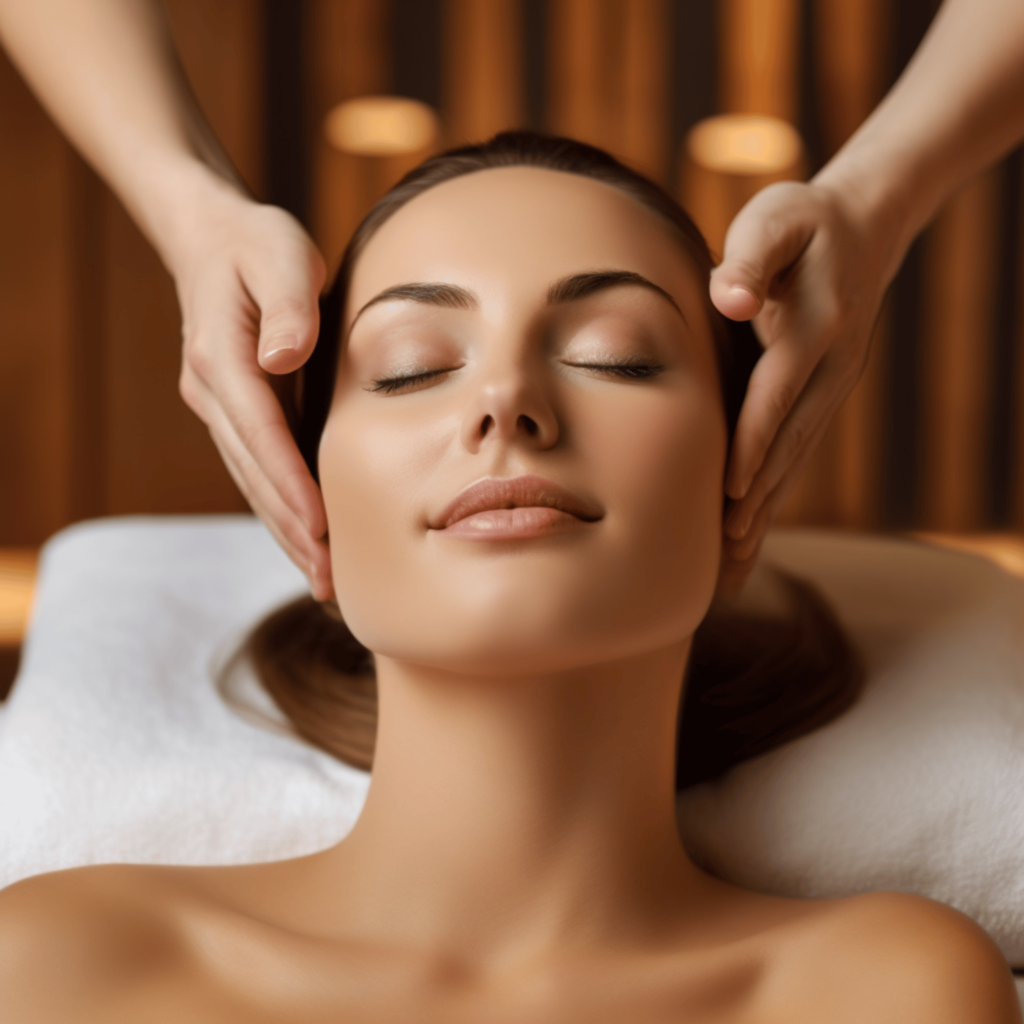
What Does The Research Say About Hemp Seed Oil?
Various studies have backed the benefits of hemp seed oil for skin health. A study published in the Journal of Dermatological Treatment found that dietary hempseed oil helped reduce the symptoms and appearance of clinical atopic dermatitis. Another study in the European Journal of Nutrition reported that hemp seed oil could help alleviate dry skin, reducing the need for skincare medication.
Is Hemp Seed Oil Suitable For All Skin Types?
Absolutely! Here’s a detailed look at how hemp seed oil can be beneficial for various skin types:
1. Dry Skin:
- Fatty Acids: Hemp seed oil is rich in essential fatty acids like omega-3 and omega-6. These fatty acids serve as emollients, which means they seal moisture into the skin. Dry skin often lacks these essential fatty acids, so supplementing with them can improve skin hydration.
- Natural Oils: It’s a natural moisturizing agent and can help to lock in hydration, making the skin feel soft and supple.
Source: The Journal of Dermatological Treatment has conducted studies indicating the importance of fatty acids in moisturizing the skin.
2. Oily Skin:
- Balancing Sebum Production: While it might seem counterintuitive, oils like hemp seed can actually help regulate the skin’s oil production. This is due to its linoleic acid content, which can help with overactive sebum production in oily skin.
- Non-Comedogenic: Unlike some oils, hemp seed oil is non-comedogenic, which means it won’t clog pores. This is crucial for those with oily skin prone to acne.
- Anti-inflammatory properties: It has natural anti-inflammatory agents that can help in reducing acne inflammation.
Source: A study in the Journal of Clinical Investigation found that linoleic acid could help treat acne and reduce sebum production.
3. Mature Skin:
- Antioxidants: Hemp seed oil contains vitamin E and vitamin C, which are powerful antioxidants. Antioxidants combat free radicals that can speed up the aging process.
- Fatty Acids: Oleic and linoleic acids, found in hemp seed oil, have been shown in studies to play a crucial role in combating skin aging.
- Boosting Collagen: The omega fatty acids in hemp seed oil can help promote the production of collagen in the skin, which is vital for maintaining the skin’s elasticity and vibrancy.
It’s important to consult with a dermatologist or skincare expert to get personalized advice on skincare products and routines suitable for one’s specific skin type and concerns.
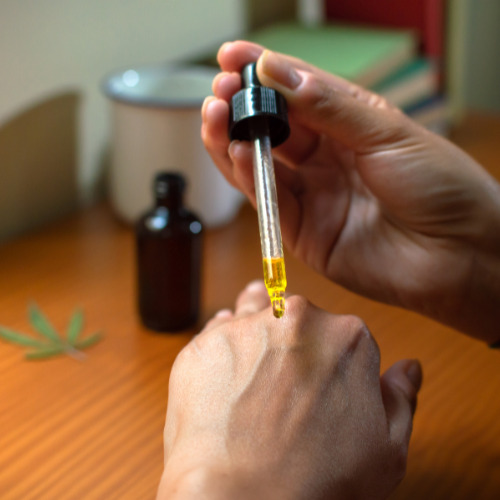
How Can You Incorporate Hemp Seed Oil Into Your Skincare Routine?
1. Topical Application:
Patch Test First: Before you start slathering hemp seed oil all over your skin, it’s important to do a patch test. This helps ensure that you’re not allergic to the oil. Here’s how to do it:
- Apply a Small Amount: Take a few drops of hemp seed oil and apply it to a small, inconspicuous area of your skin, like the inside of your wrist or behind your ear.
- Wait and Observe: Wait for about 24 hours to see if there’s any reaction. If you see any redness, itching, or other signs of irritation, it’s best not to use it. If there’s no reaction, you can proceed with using it on your face or other parts of your body.
How to Use: You can use hemp seed oil as a moisturizer after cleansing your face. Simply take a few drops on your palm, rub your hands together, and gently press onto your face. It’s light and doesn’t leave an oily residue.
2. Oral Consumption:
- Dosage: You can also benefit from hemp seed oil’s skin-friendly properties by taking it orally. Start with a small dose, like 1-2 teaspoons daily.
- Considerations: However, it’s essential to consult your doctor before you start taking hemp seed oil, especially if you’re on certain medications like blood thinners. This is because hemp seed oil is high in omega-3 and omega-6 fatty acids, which can affect blood clotting.
3. Other Ways to Use Hemp Seed Oil:
- In Your Diet: You can incorporate hemp seed oil into your diet by using it as a base for salad dressings, adding it to smoothies, or drizzling it over your favorite dishes. Just keep in mind that it shouldn’t be used for high-temperature cooking as it can lose its nutritional benefits.
- In Your Hair Care: You can use hemp seed oil as a hair oil for a scalp massage or add it to your conditioner for an extra boost of moisture.
- In Your DIY Recipes: You can also use hemp seed oil as an ingredient in your homemade skincare recipes like face masks, serums, or body lotions.

Conclusion
While hemp seed oil can offer numerous benefits for the skin, it’s essential to have realistic expectations. Consistency is key, and it may take several weeks to notice significant changes in your skin. Always ensure you’re using high-quality, cold-pressed hemp seed oil to get the maximum benefits.
Hemp seed oil is versatile and nourishing. It’s like an all-in-one skin solution that can cater to different needs, making it suitable for various skin types. Whether you’re battling dry patches or trying to fend off oily sheen, hemp seed oil has got you covered.
FAQs
Does hemp seed oil remove dark spots?
While hemp seed oil contains antioxidants that can promote skin health, it may not directly remove dark spots. However, its anti-inflammatory properties might help reduce redness associated with certain dark spots over time. For targeted dark spot treatment, consult a dermatologist.
Does hemp oil fade scars?
Hemp seed oil’s nourishing properties can contribute to overall skin health, which may help improve the appearance of scars over time. Its omega fatty acids and vitamins can aid in skin regeneration. However, complete scar fading varies based on factors like scar type and skin response.
How do you use hemp oil on your skin?
o use hemp seed oil on your skin, start with a patch test to check for allergies. For topical application, apply a few drops to clean, damp skin. Gently massage until absorbed. Use it as a moisturizer or in DIY skincare recipes. For oral use, consult a doctor and start with small doses.
Can you mix hemp oil with lotion?
Yes, you can mix hemp seed oil with your lotion. This combination can enhance the moisturizing benefits of your lotion. However, ensure you’re using compatible ingredients. Test a small amount on your skin to ensure no adverse reactions occur before applying it more widely.
Does hemp seed oil need to be refrigerated?
Yes, it’s recommended to store hemp seed oil in the refrigerator to prolong its shelf life. The cold temperature helps prevent the oil from going rancid due to oxidation. Always check the product label for specific storage instructions provided by the manufacturer.

